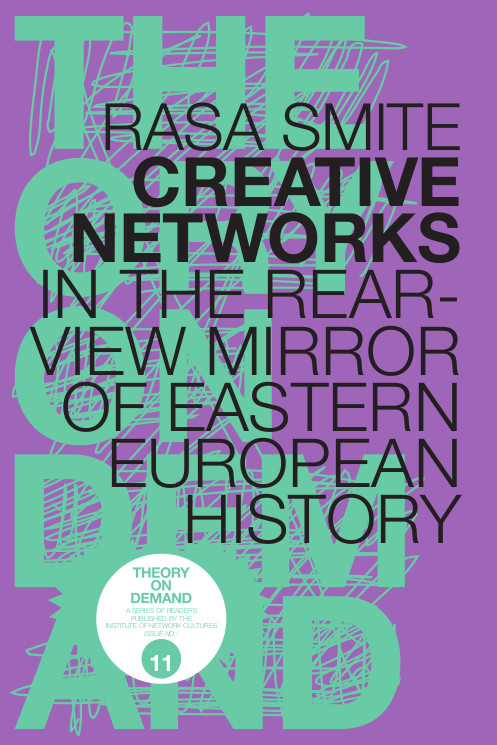Rasa Smite: Creative Networks: In the Rearview Mirror of Eastern European History (2011/2012)
Filed under book | Tags: · actor-network theory, cyberfeminism, eastern europe, internet, internet art, internet culture, latvia, media art, net art, network culture, networks, sound art, virtual communities

“Creative Networks explores the dawn of the Internet culture in the age of network society from the perspective of Eastern Europe. From a theoretical angle the networks are introduced and interpreted as complex socio-technical systems. The author analyzes the development of these networked self-organized formations starting off with ‘virtual communities’ of ‘creative networks’, which emerged during the early phase of the Internet, up to the phenomena of today’s online ‘social networks’. Along with the translocal case studies of Nettime, Syndicate, Faces and Xchange networks (as well as with the other important facets of the 1990s network culture in Europe), the author studies also local community networking case of alternative and digital culture that evolved around E-Lab in the 1990s in Latvia. By focusing primarily on the network culture of 1990s, this study reflects those changes in the social structure of today’s society that are occurring under the process of socio-technical transformation.
The book is based on a dissertation by Rasa Smite, with the title Creative Network Communities and was defended in Riga Stradins University, February 2011.”
First published in Latvian in Riga: RIXC and Liepaja: LiepU MPLab, 2011.
Translated by Linda Vebere
Publisher Institute of Network Cultures, Amsterdam 2012
Creative Commons Attribution Noncommercial No Derivative Works 3.0 Netherlands License
ISBN 9789081857505
160 pages
Review: Piibe Piirma (Baltic Screen Media Review, 2014).
PDF (updated on 2023-9-27)
Comment (0)Bogumiła Suwara, Zuzana Husárová (eds.): V sieti strednej Európy: nielen o elektronickej literatúre: (2012) [Slovak, Czech]
Filed under book | Tags: · central europe, computer games, digital text, electronic literature, experimental literature, hypermedia, internet, literature, networks, poetry, text, theory, writing

(EN) This international collective monograph brings an understanding of the problematic of changes in artistic communication in the context of the cultural practices of the post-digital era and simultaneously asks new questions about it. This book presents the keystones of electronic literature research that are based, among others, on the digital character of the text, on multisensory reading, playfulness, hypermediality, experimentation and Internet communication. Its aim is also to map digital literature in the cultural environment of Central Europe. Researchers from Slovakia, The Czech Republic, Poland, Slovenia and Croatia collaborated on the publication. The monograph is a printed textual tapestry of various approaches, theories and perspectives that communicate among themselves, react to each other and together clarify the structure that literature personifies in the new media realm.
(SK) Kolektívna monografia prináša nové poznatky a zároveň kladie otázky o problematike zmien v umeleckej komunikácii v kontexte kultúry post-digitálnej doby. Prezentuje piliere výskumu elektronickej literatúry, ktoré okrem iného stoja na digitálnej podstate textu, na multisenzorickom čítaní, hravosti a hypermedialite, experimente a internetovej komunikácii. Cieľom je zároveň zmapovať recepciu digitálnej literatúry v kultúrnom prostredí strednej Európy. Na publikácii participovali bádatelia zo Slovenska, Čiech, Poľska, Slovinska a Chorvátska. Monografia je tlačenou textovou sieťou rôznych prístupov, teórií a hľadísk, ktoré vzájomne komunikujú, reagujú a spoločne dospievajú k osvetleniu štruktúry, ktorú literatúra v novo-mediálnom prostredí zosobňuje.
Contributions by Zuzana Husárová, Jana Kuzmíková, Gabriela Magová, Mira Nabělková, Andrzej Pająk, Katarina Peović Vuković, Mariusz Pisarski, Michal Rehúš a Jaroslav Šrank, Janez Strehovec, Bogumiła Suwara, Jaroslav Švelch
Publisher: SAP & Ústav svetovej literatúry SAV, Bratislava, 2012
Design and cover: Katarína Gatialová
ISBN 9788080950767
312 pages
Quo vadis elektronická kultúra? (a series of activities around the publication, Bratislava, 26-27 September 2012)
PDF (updated on 2012-9-25)
EPUB (updated on 2012-9-25)
Julia Schramm: Klick mich: Bekenntnisse einer Internet-Exhibitionistin (2012) [German]
Filed under book | Tags: · biography, blogging, germany, internet, pirate party, politics

Politologin, Publizistin, Piratin, Provokateurin, Privilegienmuschi, Post-Gender-Feministin, Politikerin.
Sie leben im Netz. Sie kommen aus dem Netz. Sie kennen die echte Welt und haben noch eine Welt hinter dem Monitor, mit allen Geschichten, allen Bildern, allem Wissen der Menschheit. Von dort aus erobern sie die Wirklichkeit. Die Kinder des digitalen Zeitalters sitzen mittlerweile in den Parlamenten und stehen mächtigen Firmen vor. Wir müssen sie kennenlernen. Julia Schramm – die, die aus dem Internet kommt – erzählt ihre Geschichte. Was sie macht. Wie sie lebt. Wie sie denkt.
»Mein Name ist Julia und ich lebe im Internet. Ich bin da ziemlich glücklich, habe Freunde, die ich nur digital kenne und abschalten kann, wann ich will. Ich kann im Internet alles sein: Mafiaboss, Barbie, Hitler, Hotelbesitzer und ein kleines grünes Krokodil. Am Computer bin ich Gott. Und dabei fühle ich mich großartig – großartig böse, kalt und berechnend. Bereits in jungen Jahren, mit 13 oder 14, war ich mir über die schier endlosen Möglichkeiten der Identitätskonstruktion bewusst. Das Internet war der Ort, wo ich alles zum ersten Mal erlebte: Liebe, Sex und Verrat. Aufklärung, Freiheit und Politik. Dort rede, lache, weine und denke ich. Denn ich bin ein Kind des digitalen Zeitalters, ich bin die, die aus dem Internet kommt. Und das ist meine Geschichte.«
Publisher Albrecht Knaus, Muenchen, Random House, 2012
ISBN 3641081920, 9783641081928
208 pages
FAIL – Prominent Pirate Party Politician Goes After Book Pirates (Torrentfreak)
Pirate Party Member Insists on Copyright for Book (Spiegel)
author
wikipedia
publisher
google books

